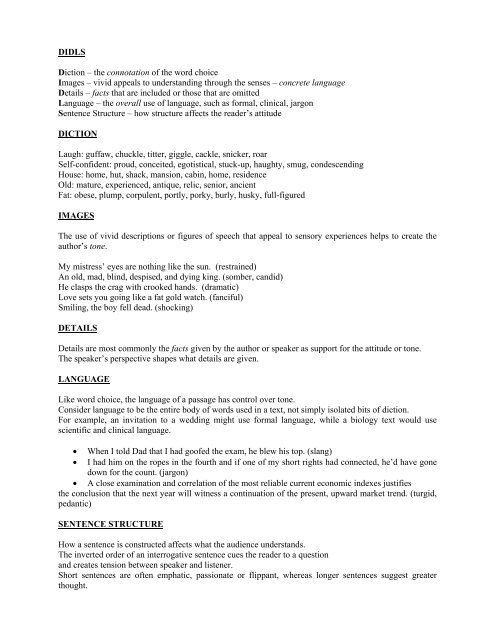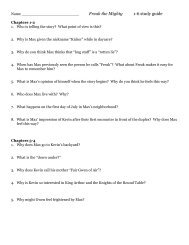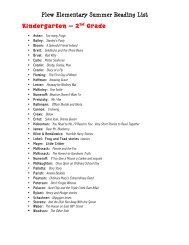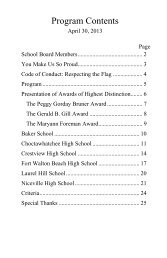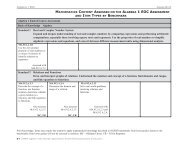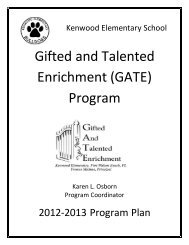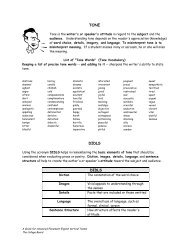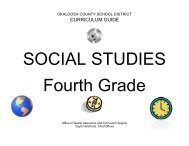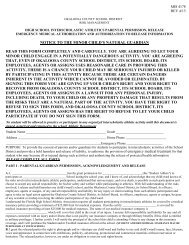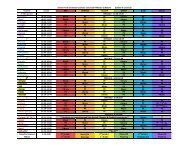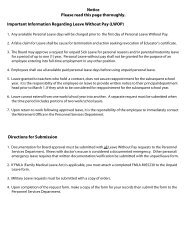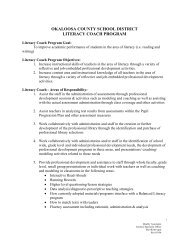didls soaps tpcastt
didls soaps tpcastt
didls soaps tpcastt
- No tags were found...
You also want an ePaper? Increase the reach of your titles
YUMPU automatically turns print PDFs into web optimized ePapers that Google loves.
DIDLSDiction – the connotation of the word choiceImages – vivid appeals to understanding through the senses – concrete languageDetails – facts that are included or those that are omittedLanguage – the overall use of language, such as formal, clinical, jargonSentence Structure – how structure affects the reader’s attitudeDICTIONLaugh: guffaw, chuckle, titter, giggle, cackle, snicker, roarSelf-confident: proud, conceited, egotistical, stuck-up, haughty, smug, condescendingHouse: home, hut, shack, mansion, cabin, home, residenceOld: mature, experienced, antique, relic, senior, ancientFat: obese, plump, corpulent, portly, porky, burly, husky, full-figuredIMAGESThe use of vivid descriptions or figures of speech that appeal to sensory experiences helps to create theauthor’s tone.My mistress’ eyes are nothing like the sun. (restrained)An old, mad, blind, despised, and dying king. (somber, candid)He clasps the crag with crooked hands. (dramatic)Love sets you going like a fat gold watch. (fanciful)Smiling, the boy fell dead. (shocking)DETAILSDetails are most commonly the facts given by the author or speaker as support for the attitude or tone.The speaker’s perspective shapes what details are given.LANGUAGELike word choice, the language of a passage has control over tone.Consider language to be the entire body of words used in a text, not simply isolated bits of diction.For example, an invitation to a wedding might use formal language, while a biology text would usescientific and clinical language.• When I told Dad that I had goofed the exam, he blew his top. (slang)• I had him on the ropes in the fourth and if one of my short rights had connected, he’d have gonedown for the count. (jargon)• A close examination and correlation of the most reliable current economic indexes justifiesthe conclusion that the next year will witness a continuation of the present, upward market trend. (turgid,pedantic)SENTENCE STRUCTUREHow a sentence is constructed affects what the audience understands.The inverted order of an interrogative sentence cues the reader to a questionand creates tension between speaker and listener.Short sentences are often emphatic, passionate or flippant, whereas longer sentences suggest greaterthought.
Sentence structure affects tone.SHIFT IN TONEGood authors are rarely monotone. A speaker’s attitude can shift on a topic, or an author might have oneattitude toward the audience and another toward the subject. The following are some clues to watch forshifts in tone:- - key words (but, yet, nevertheless, however, although)- - punctuation (dashes, periods, colons)- - paragraph divisions- - changes in sentence length- - sharp contrasts in dictionExample:At the passage "earth to earth, ashes to ashes, dust to dust" there was a little alteration of the words to suitthe process. A door opened in the wall: and the violet coffin mysteriously passed out through it andvanished as it closed. People think that the door is the door of the furnace: but it isn't. I went behind thescenes at the end of the service and saw the real thing. People are afraid to see it; but it is wonderful. Ifound there the violet coffin opposite another door, a real unmistakable furnace door this time: when itlifted there was a plain little chamber of cement and fire-brick. No heat, no noise. No roaring draught. Noflame. No fuel. It looked cool, clean, sunny. You would have walked in or put your hand in withoutmisgiving. Then the violet coffin moved again and went in, feet first. And behold! The feet burstmiraculously into streaming ribbons of garnet coloured lovely flame, smokeless and eager, likepentecostal tongues, and as the whole coffin passed in, it sprang into flame all over; my mother becamethat beautiful fire. The door fell; well, they said that if we wanted to see it all through to the end, weshould come back in an hour and a half. I remembered the wasted little figure with the wonderful face,and said, "Too long" to myself—but off we went... When we returned, the end was wildly funny; Mamawould have enjoyed it enormously. We looked down through an opening in the floor. There we saw aroomy kitchen, with a big cement table and two cooks busy at it. They had little tongs in their hands, andthey were deftly and busily picking nails and scraps of coffin handles out of Mama's dainty little heap ofashes and samples of bone. Mama herself being at the moment leaning over beside me, shaking withlaughter. Then they swept her up into a sieve and shook her out; so that there was a heap of dust and aheap of bone scraps. And Mama said in my ear, "Which of the two heaps do you suppose is me?..." andthat merry episode was the end, except for making dust of the bone scraps and scattering them on a flowbed... O grave, where is thy victory?... And so goodnight, friends who understand about one's mother.- The Society of Authors on Behalf of the George Bernard Shaw EstateDiction: vanished, cool, clean, sunny, violet, miraculously, garnet, flame, PentecostalThe diction has a clean and beautiful connotation. The different colors give the image of great beauty.The words miraculously and pentecostal have the connotation of something holy.Imagery: violet coffin; streaming ribbons of garnet coloured lovely flame, smokeless and eager; mymother became that beautiful fire; dainty little heapThe images suggest happiness. The violet coffin represents spring because the violet is a spring flower.Spring is reminiscent of happiness and rebirth. The man views his mother’s cremation not as sad, butinstead a happy and beautiful thing.
ShiftsNote transitions in the poem. Shifts in subject, attitude, mood, or motif.TitleExamine the title again, this time on an interpretive level. Answer your questions. Figure out howthe title illuminates the poem. Remember a “naming title” may not mean much. Remember you cando this with the first line of a poem if it lacks a title or you can skip this step altogether.ThemeAfter identifying a subject/topic of the poem, determine what the poet thinks about the subject.What is his/her opinion?SOAPSSOAPS is handy as a general introduction to a poem. If you are having a tough time getting any meaningat all from a poem, SOAPS will lead you to at least a basic understanding.Subject—the general topic, content and ideas in the poem.Occasion—The time and place of the poem. Try to understand the context that encouraged the poem tobe written.Audience—To whom is the poem written?Purpose—What is the reason behind the writing of the poem?Speaker—What can you say about the voice speaking the poem?After reading the poem through once, take a moment to write a few complete thoughts regarding each ofthe above subjects.


